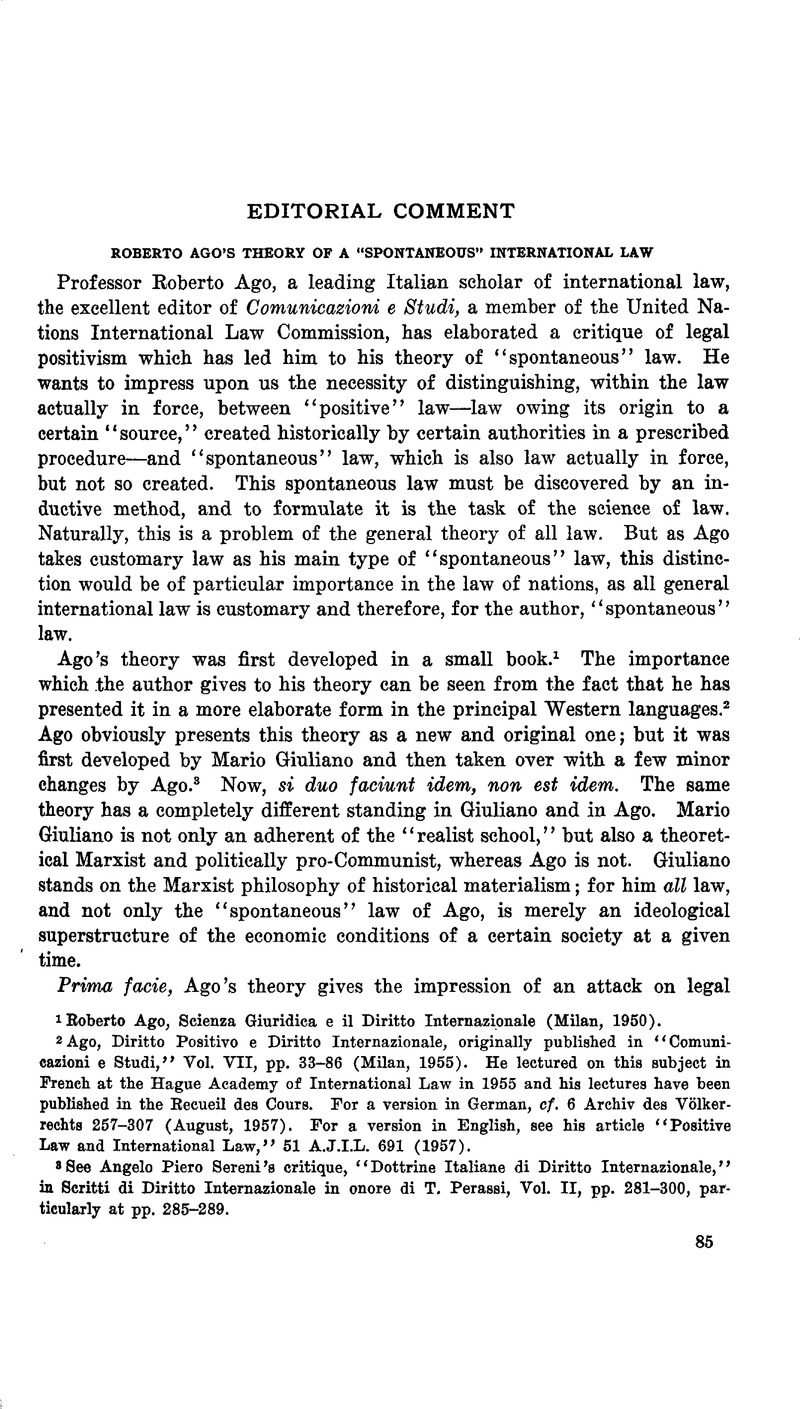Article contents
Roberto Ago’s Theory of a “Spontaneous” International Law
Published online by Cambridge University Press: 28 March 2017
Abstract

- Type
- Editorial Comment
- Information
- Copyright
- Copyright © American Society of International Law 1958
References
1 Roberto Ago, Scienza Giuridica e il Diritto Internazionale (Milan, 1950).
2 Ago, Diritto Positivo e Diritto Internazionale, originally published in ‘’ Comunicazioni e Studi,” Vol. VII, pp. 33-86 (Milan, 1955). He lectured on this subject in French at the Hague Academy of International Law in 1955 and his lectures have been published in the Recueil des Cours. For a version in German, cf. 6 Archiv des Völkerrechts 257-307 (August, 1957). For a version in English, see his article “Positive Law and International Law,” 51 A.J.I.L. 691 (1957).
3 See Angelo Piero Sereni's critique, “Dottrine Italiane di Diritto Internazionale,” in Scritti di Diritto Internazionale in onore di T, Perassi, Vol. II, pp. 281-300, particularly at pp. 285-289.
4 Fatti normative.
5 See this writer's study, ‘'The Nature of Customary International Law,'’ 47 A.J.I.L. 662 (1953).
6 Francisco a Vitoria, who uses the term “jus gentium” in the Eoman sense and in the sense of later international law, says that the jus gentium is different from natural law. Francisco Suárez, who, first, uses the term “jus gentium” in the modern sense of international law, wrote unambiguously: “jus gentium simpliciter esse humanum ac positivum.” De legibus, lib. II, cap. XIX.
7 Ago himself quotes the definition of Damaso (1215): “jus positivum, expositum ab homine,” and of Abelard: positive law is “quod ab hominibus institutum est.” In both cases the term is used in contrast to natural law. In his discussion “De Indis” Vitoria writes that “paganism takes away neither natural, nor positive human law.”
8 ‘'Law is always positive law, and its positivity lies in the fact that it is created and annulled by acts of human beings.'’ H. Kelsen, General Theory of Law and State 114 (1945).
9 Op. at. note 8, p. 131.
10 See, e.g., A. Verdross, Völkerreeht 118 (3rd ed., Vienna, 1955).
11 '’ The rules of ease law are the by-product of the continuous process of judicial settlement of particular controversies. The latter rules are not contained in official text form.” John Hanna, “The role of precedent in judicial decision,” Villanova Law Review, April, 1957, pp. 367-384, at p. 380.
12 Abelard, defining positive as man-made law, distinguishes within positive law written and unwritten positive law. Suárez, defining jus gentium as positive, man-made law, states at the same time that it is a law “quae magis traditione et consuetudine quam constitutione aliqua introductum est“: it is positive law, although primarily “non scriptum,” but “ab usu.” De legibus, lib. III. cap. 2, no. 6.
13 H. Kelsen, What is Justice? 258 (Berkeley, 1957); reviewed in 51 A.J.I.L. 830 (1957).
14 Kelsen, op. cit. note 8, p. 45.
15 L. Duguit, L'Etat, le droit objectif et la loi 16 (1901).
16 Op. tit. note 3 above.
17 According to Funk and Wagnalls’ New Standard Dictionary of the English language (New York, 1956, p. 2349), “spontaneous” may mean many, even contrary things: “Automatic, instinctive, involuntary, voluntary, willing. Voluntary and involuntary are both partial synonyms of spontaneous.”
- 2
- Cited by




